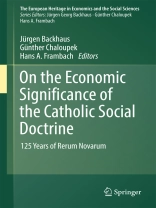This book discusses the history and socioeconomic impact of Rerum novarum, the first Catholic social encyclical. Drawn from research presented at the 2016 Heilbronn Symposia on Economics and the Social Sciences, this book resumes the discussion on the origin, dissemination and impact of the Catholic social doctrine which originated in this epoch-making encyclical, arguing that the fundamental concepts of this doctrine have had long-standing influence on the development of the modern social state and social market economy. Beginning with an introductory background on the Rerum novarum, the book moves through chapters focused on the implementation and application of the doctrine throughout its history and the impact it has had on global economics. The book starts with the contributions of precursors and pioneers of the doctrine such as Bishop Wilhelm von Ketteler , proceeds to the reception of Rerum novarum after its implementation, and presents examples ofits application. It then moves to the central question of Rerum novarum on the role of land, the taxation of immovable property, and more generally, justice. The book concludes with comments on the wider significance of Rerum novarum and Catholic social doctrine from a sociological and theological perspective. This book will be useful for academic researchers interested in theoretical economic history, political science and history, economic thought, as well as contemporary global and social issues from the perspective of the Christian faith.
Table of Content
Introduction: 125 Years of Rerum Novarum.- Chapter 1: An Economist’s View on the Work of Wilhelm Emmanuel von Ketteler and its Influence on the Encyclical Rerum Novarum.- Chapter 2: Solidarism as the Centre of Economy – The Economics of Heinrich Pesch.- Chapter 3: The False Pretensions of the Catholic Social Doctrine – the Critique of the Austrian Catholic Sociologist August M. Knoll.- Chapter 4: Lord Acton and Rerum Novarum.- Chapter 5: Dr. Johannes Antonius Veraart: A Catholic Economist on Rerum Novarum.- Chapter 6: Catholic and Socialist Conceptions of Public Organization of Business in the Netherlands: Their Rise, Joint Implementation and Fall.- Chapter 7: Public Economy (Gemeinwirtschaft) as a Concept of Social Development Policy- Examples of German Authors of the Late 19th Century.- Chapter 8: Re-Shaping the Christian Ethical Tradition- Franz brandts, Leon Harmel and the Role of Christian Entrepreneurs for Rerum Novarum.- Chapter 9: Rerum Novarum and the Taxation of Immovable Property.- Chapter 10: The Justice and Economics of Rerum Novarum on Land.- Chapter 11: 125 Years Rerum Novarum: The Theological Perspective.
About the author
Jürgen G. Backhaus (*1950), JSD 1976, Ph D (Econ) 1985, Professor of Public Finance and Fiscal Sociology at Erfurt University 2000-2015. Between 1986 and 2000, he has held the chair in Public Economics at Maastricht University. In 2006 he received the Cross of the Order of Merit of the Federal Republic of Germany (Knight’s Cross), in September 2004 he was awarded an honorary doctorate by the University of Thessaly (Greece). In 1994 he founded (with Frank H. Stephen) the European Journal of Law and Economics. He has published 60 books and monographs, about 200 articles in refereed journals and book chapters, 28 scholarly notes and 63 reviews. His research interests span economics, but also neighboring disciplines such as law, fiscal sociology and environmental sciences.












